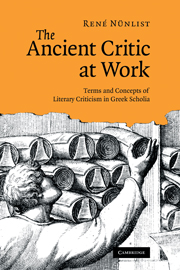Book contents
- Frontmatter
- Contents
- Acknowledgments
- Introduction
- PART I
- 1 Plot
- 2 Time
- 3 Narrative and speech
- 4 Focalisation
- 5 Effects on the reader
- 6 Gaps and omissions
- 7 Poetic licence
- 8 Authentication
- 9 Style
- 10 Allusions, hints, hidden meanings
- 11 Characters
- 12 Mythography
- PART II
- Epilogue
- Glossary of Greek terms
- Editions of scholia
- Other abbreviations
- Bibliography
- Thematic index
- Index locorum
11 - Characters
Published online by Cambridge University Press: 29 August 2009
- Frontmatter
- Contents
- Acknowledgments
- Introduction
- PART I
- 1 Plot
- 2 Time
- 3 Narrative and speech
- 4 Focalisation
- 5 Effects on the reader
- 6 Gaps and omissions
- 7 Poetic licence
- 8 Authentication
- 9 Style
- 10 Allusions, hints, hidden meanings
- 11 Characters
- 12 Mythography
- PART II
- Epilogue
- Glossary of Greek terms
- Editions of scholia
- Other abbreviations
- Bibliography
- Thematic index
- Index locorum
Summary
The masterpieces of Greek literature such as Homeric epic and Attic tragedy owe their deep and lasting effect not least to the prominence of fascinating and highly individualised characters. Readers (and spectators) of all times recognise immediately that the characters and their depiction are a central focus of Greek poetry. Little surprise, then, that ancient critics also paid considerable attention to the topic. The present survey first examines issues regarding the casts of dramatic and narrative texts and then turns to the question of characterisation itself.
CAST
In dramatic texts, the cast is limited in size for generic reasons and therefore does not pose major problems to a proper understanding. In tragedy, the number of speaking characters rarely exceeds ten and is unlikely to confuse an attentive reader. Ancient commentators generally confine themselves to listing the dramatis personae at the end of the hypothesis, often in the sequence in which they enter the stage for the first time (e.g. argum. A. Ag. p. 2 Smith). Occasionally, the hypothesis contains a few general remarks on characterisation (see below), but the identity of the characters does not receive much attention either in hypotheseis or in scholia to tragedy. The cast of Aristophanes' comedies tends to be somewhat larger and is, of course, not bound by tradition (Arist. Po. 1451b13–14). The extant scholia on Aristophanes, however, show little further interest in questions of casting.
- Type
- Chapter
- Information
- The Ancient Critic at WorkTerms and Concepts of Literary Criticism in Greek Scholia, pp. 238 - 256Publisher: Cambridge University PressPrint publication year: 2009



